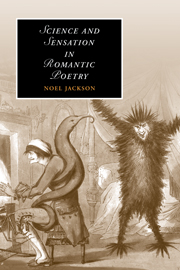Book contents
- Frontmatter
- Contents
- List of illustrations
- Acknowledgments
- List of abbreviations
- Introduction: Lyrical forms and empirical realities: reading Romanticism's “language of the sense”
- PART I SENSES OF HISTORY: BETWEEN THE MIND AND THE WORLD
- PART II SENSES OF COMMUNITY: LYRIC SUBJECTIVITY AND “THE CULTURE OF THE FEELINGS”
- 3 Critical conditions: Coleridge, “common sense,” and the literature of self-experiment
- 4 Sense and consensus: Wordsworth, aesthetic culture, and the poet-physician
- PART III THE PERSISTENCE OF THE AESTHETIC: AFTERLIVES OF ROMANTICISM
- Notes
- Select bibliography
- Index
- CAMBRIDGE STUDIES IN ROMANTICISM
3 - Critical conditions: Coleridge, “common sense,” and the literature of self-experiment
Published online by Cambridge University Press: 22 September 2009
- Frontmatter
- Contents
- List of illustrations
- Acknowledgments
- List of abbreviations
- Introduction: Lyrical forms and empirical realities: reading Romanticism's “language of the sense”
- PART I SENSES OF HISTORY: BETWEEN THE MIND AND THE WORLD
- PART II SENSES OF COMMUNITY: LYRIC SUBJECTIVITY AND “THE CULTURE OF THE FEELINGS”
- 3 Critical conditions: Coleridge, “common sense,” and the literature of self-experiment
- 4 Sense and consensus: Wordsworth, aesthetic culture, and the poet-physician
- PART III THE PERSISTENCE OF THE AESTHETIC: AFTERLIVES OF ROMANTICISM
- Notes
- Select bibliography
- Index
- CAMBRIDGE STUDIES IN ROMANTICISM
Summary
In the Preface to the Lyrical Ballads, Wordsworth famously wrote of the tendency of his poems to evoke feelings of “more than common pleasure” in the reader. It is with the aim of delivering such pleasures that Wordsworth urges the reader to judge “by his own feelings genuinely” against what the poet took to be a prevailing tendency to decide on the basis of “what will probably be the judgment of others” (LB, 241–2, 270). Few remarks serve as a better reminder of how fully Wordsworth was committed to refining and reforming common laws of judgment and understanding. In this aim, of course, the poet finds common cause with his friend and creative partner Coleridge, who insisted throughout his life on the necessity of elevating common sense through philosophical thought and rigorous self-reflection: “it is the two-fold function of philosophy,” Coleridge wrote in the Biographia Literaria, “to reconcile reason with common sense, and to elevate common sense into reason” (BL, 1:270). Yet consult, in that same volume, Coleridge's critique of Wordsworth's use of common language, and you have a notion of how much more openly sworn was the former to maintaining the distinction (whose initial framing was Anna Seward's, and whose canonical formulation we owe to Hazlitt) between “genius” and “common sense” (BL, 2:40–57).
- Type
- Chapter
- Information
- Science and Sensation in Romantic Poetry , pp. 103 - 131Publisher: Cambridge University PressPrint publication year: 2008



